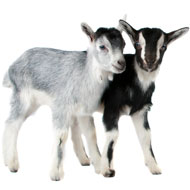
BVA and Goat Veterinary Society issue new recommendations
Anaesthetic must be used, and analgesia should be used for all disbudding procedures in goat kids, according to a new position paper by the BVA and Goat Veterinary Society (GVS).
Disbudding, which refers to the surgical removal of the horn buds, usually occurs within the first seven days of life to prevent injury to the goat or other animals in its environment. It involves cauterising the horn buds with hot irons after cutting off any well-developed tips.
The paper points out that disbudding is a skilled, high-risk procedure that can be stressful for goat kids. There is evidence to suggest that there are changes in behaviour and physiology that are associated with pain and distress, both during and after the procedure.
BVA and GVS made a series of three recommendations:
1. Veterinary surgeons carrying out disbudding must be proficient in undertaking the procedure.
2. Anaesthesia must be used and analgesia should be used for all disbudding procedures. The position paper says the safest and simplest solution is general anaesthesia induced prior to disbudding. If local anaesthesia is used, an effective block of four nerves is needed to desensitise the buds, leading to a potentially toxic overdose of local anaesthetic in a high-risk neonatal kid.
However, the paper recognises that in skilled hands, local anaesthesia can provide a satisfactory solution, especially on-farm.
3. The principles of the cascade should be applied when prescribing analgesics, as there are no analgesics licensed for use in goats in the UK, and none licensed for animals of only a few days old. Goat keepers should be advised of both the risks and benefits, as part of gaining informed consent for the disbudding procedure.
BVA president John Fishwick said: “Following a review of available evidence, we consider the use of appropriate anaesthesia and analgesia as vital to the welfare of goats at the time of disbudding, which is why I’d like to ask all veterinary surgeons working with goats to take our recommendations into account.
“Disbudding goat kids is a specialised procedure with potential risks and so it is important that vets carrying it out are highly proficient and aware of the potential hazards.”
GVS chairman David Harwood added: “GVS is pleased to join BVA in developing this joint position on the disbudding of goat kids. Although it is not always necessary to remove the horn buds, when the procedure is carried out, the welfare of the kid should be of paramount importance.
“Any veterinary surgeon seeing goats on even an occasional basis may get in touch with the Goat Veterinary Society for help or advice on disbudding.”



 The Federation of Independent Veterinary Practices (FIVP) has announced a third season of its podcast, Practice Matters.
The Federation of Independent Veterinary Practices (FIVP) has announced a third season of its podcast, Practice Matters.